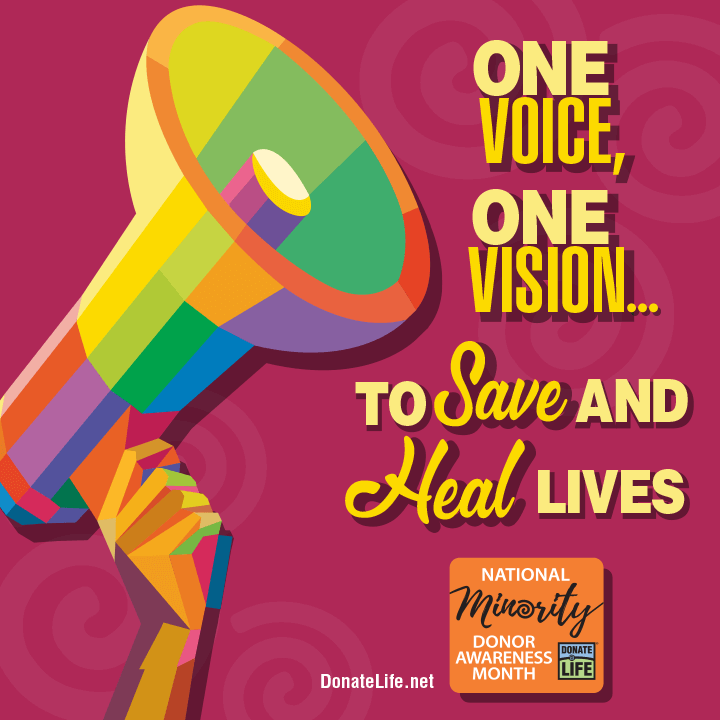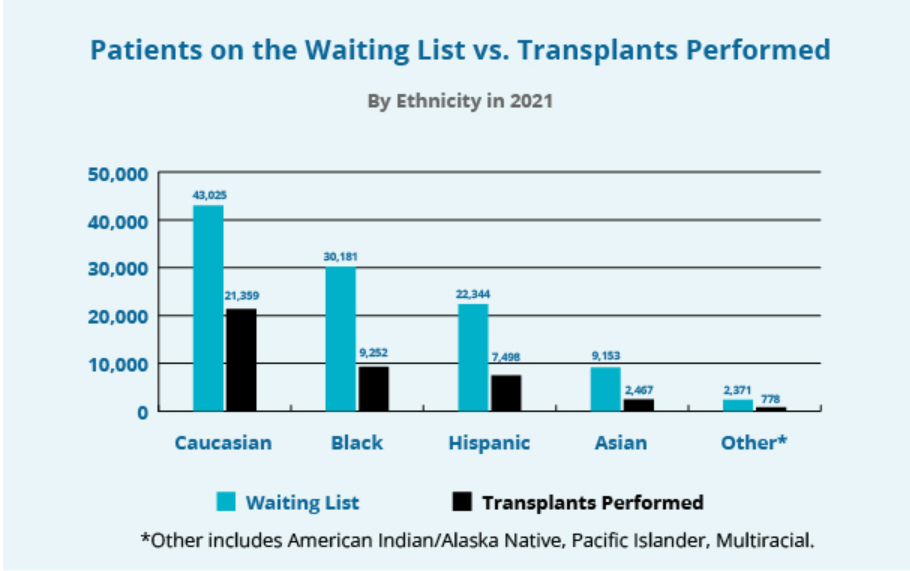
Share On Social!
Just as Latinos are underrepresented in medicine and clinical trials, they are also underrepresented in organ donation.
In honor of August being National Minority Donor Awareness Month, here’s everything you need to know about organ donation, and why you should become a donor.
What is Organ Donation and Transplantation?
Organ donation and transplantation involves removing an organ from one person (the donor) and surgically placing it in another (the recipient).
This process is done when the recipient’s organ has failed and they need a new organ to survive.
Organ donation and transplantation can be performed with both living and deceased donors.
Living Donation
A living donation is an opportunity to save a life when you are still alive.
Organs that can be donated through a living donation include one kidney (in high demand), one liver lobe, a lung or part of a lung, part of the pancreas, and part of the intestines.
You can also donate several types of tissues, including skin and bones, and biospecimens, such as blood and saliva, while alive.
Deceased Donation
Deceased donations occur after death and can help save eight lives and enhance 75 more.
Many people feel that they have no use for their organs after death, so deceased donation gives them the chance to help someone else live a longer, healthier life.
You can donate a wide variety of organs and tissues after passing.
Donating most organs after death does not interfere with funeral arrangements, including a viewing.
Why Does Diversity in Organ Donation Matter?

There is a considerable gap between the number of Latino organ donors and the number of Latinos who need lifesaving organ transplants.
Although donation and transplantation can take place successfully between individuals from different racial or ethnic groups, transplant success is often better when organs are matched between people of the same racial or ethnic background, according to Donate Life America.
How Big is the Latino Donation Gap?
The number of organ transplants performed on Latinos in 2020 was about 30% of the number of Latinos currently waiting for a transplant.
In comparison, the number of transplants performed on whites was 48.8% of the number currently waiting, according to the US Department of Health and Human Services Office of Minority Health.
Although the Latino population in the US has risen to a record-high of 18.9%, Latinos comprised just 14.6% of organ donors in 2020.
Why is There a Latino Donation Gap?
There are many myths associated with organ donation.
For example, some believe that their organs will be taken from them without consent.
However, both living and deceased donations require consent from the donor. If a person has passed but is not on the donor registry list, their next of kin or legally authorized representative is offered the opportunity to approve a deceased donation after the patient is declared legally and clinically dead.
Another myth is that organ donors are less likely to be saved if they are dying. This simply is not true; your life will always come first.
In addition to myths, religion can also play a role in one’s likelihood of becoming an organ donor. All major religions accept organ donation as a final act of generosity.
Why You Should Be an Organ Donor
It may feel uncomfortable to think about transplantation surgery and what will happen to your body after you die.
It may even feel strange to think about your organ being in someone else’s body.
But the bottom line is that organ donation can give someone else another chance at life.
For example, Jade Hércules was diagnosed with terminal liver disease the same year she was born. A liver transplant allowed her parents to see her grow up.
“We were grateful to God for the parents who had the courage to donate their little boy’s organs, because thanks to them, our little girl is alive,” said Jesus Alexander Hércules, Jade’s father.
Carolina Rivera, a mother of two adult children who donated their organs after their passing, is proud that her sons each helped more than 70 people.
“My sons continue living in over 70 people because they donated tissues, their corneas, their bones, their skin,” Rivera told NBC News.
Although 90% of adults support organ donation, only 60% are actually signed up as donors, causing a general shortage of organ donations for all races/ethnicities, but especially for minorities, such as Latinos.
How Can I Become an Organ Donor?
You can register to become an organ donor at the state and/or national level.
You can sign up to be an organ donor at the state level when getting your driver’s license at your local DMV.
You can sign up at the national level through the National Donate Life Registry.
Once you make the decision to become an organ donor, let loved ones know of your wishes.
Latinos, you have the power to save a life, and its as simple as joining a donor registry!
How Else Can I Help Others?
Along with organ donation, you can participate in clinical trials to help researchers learn how to slow, manage, and treat certain diseases, such as cancer and Alzheimer’s disease.
Without Latino participants, the health benefits of clinical trials may miss this group.
“Latinos in clinical trials are not only helping themselves, but they’re also building a future with better treatments that can help their families in the future,” said Dr. Amelie Ramirez, director of the Institute for Health Promotion Research and Salud America! at UT Health San Antonio, who is expanding Latino clinical trial recruitment through a grant from Genentech, a member of the Roche Group.
To find a clinical trial to participate in, visit the Salud America! clinical trials page.
Explore More:
Clinical TrialsBy The Numbers
142
Percent
Expected rise in Latino cancer cases in coming years



